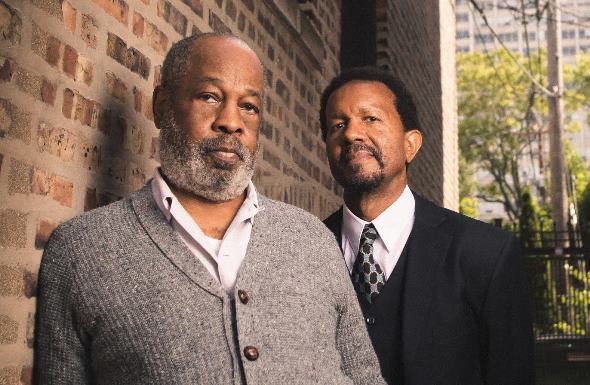Theater 2018-19: Court maps world premiere and last play in the Wilson cycle: ‘Radio Golf’
Third in a series of season previews: Saul Bellow’s “Augie March,” adapted by David Auburn, will close Court Theatre’s coming year.
By Lawrence B. Johnson
Court Theatre will cap its 64th season – and artistic director Charles Newell’s 24th year at the helm — with the world premiere adaptation of Saul Bellow’s novel “The Adventures of Augie March,” and kick it off with August Wilson’s “Radio Golf,” the tenth and final installment in his chronicle of the African American experience.
 Playwright David Auburn’s adaptation of “Augie March” has been in development for three years, Newell said: “This is the first time the Bellow estate has allowed an adaptation of one of his novels. ‘Augie March’ is Bellow’s own biography, starting in a poor Jewish family in Chicago in the 1930s. It’s a hero’s journey, a quest to find his own identity.”
Playwright David Auburn’s adaptation of “Augie March” has been in development for three years, Newell said: “This is the first time the Bellow estate has allowed an adaptation of one of his novels. ‘Augie March’ is Bellow’s own biography, starting in a poor Jewish family in Chicago in the 1930s. It’s a hero’s journey, a quest to find his own identity.”
Between those bookends fall three more plays: Mary Shelley’s gothic tale “Frankenstein,” adapted by Manual Cinema using shadow puppetry and cinematic techniques; Anna Ziegler’s “Photograph 51” about scientist Rosalind Franklin’s key role in the discovery of DNA; and Ntozake Shange’s “For Colored Girls Who Have Considered Suicide When the Rainbow Is Enuf” – directed by Seret Scott, a member of the original Broadway cast from 1976-78.
The 2018-19 season in brief:
- “Radio Golf” by August Wilson (Sept. 8-30): Real estate developer Harmond Wilks is determined to become the first black mayor of Pittsburgh, on a mission to revive his blighted childhood neighborhood. As Wilks confronts characters from the past, he is forced to question how pursuing change could put his neighborhood’s history at risk. This is the seventh of the 10 plays in Wilson’s Pittsburgh cycle that Ron OJ Parson has directed at Court. “There’s a wonderful musicality in the text,” says Newell. “These five artists (Parson with actors Allen Gilmore, Alfred H. Wilson, James Vincent Meredith and Tyla Abercrombie) are like a great jazz quintet. They know how to play Wilson’s music.”
- “Frankenstein” by Mary Shelley, adapted by Manual Cinema (Nov. 1-Dec. 2): Love, loss, and creation merge in unexpected ways in this classic thriller brought to the stage by Manual Cinema. Led by former Court dramaturg Drew Dir, Manual Cinema combines handmade shadow puppetry, cinematic techniques, and innovative sound and music to create immersive visual stories for stage and screen. Intertwining stories of Mary Shelley, Victor Frankenstein and his creature expose how the forces of family, community and education shape a person, or destroy it. “There’s an exquisite artistic quality in Manual Cinema’s shadow puppetry,” says Newell. “This famous story really operates on several levels, and significant parts of the novel are not familiar. It’s mutilayered, with dovetailing narratives, one feeding into another.”
 “Photograph 51” by Anna Ziegler (Jan. 17-Feb. 17, 2019): History may well remember the work of Watson and Crick that shaped biology, but it was British chemist Rosalind Franklin who provided the key to the discovery of double helix DNA – or deoxyribonucleic acid, a self-replicating material present in nearly all living organisms and the carrier of genetic information. “Photograph 51” is the story of a dedicated female scientist and her pursuit of the secret of life. “This woman’s photography was such an important part of the discovery of DNA, and yet she received very little acknowledgement,” says Newell. “It’s the journey of a reclusive woman from a Jewish family thrust into a male Protestant work environment.”
“Photograph 51” by Anna Ziegler (Jan. 17-Feb. 17, 2019): History may well remember the work of Watson and Crick that shaped biology, but it was British chemist Rosalind Franklin who provided the key to the discovery of double helix DNA – or deoxyribonucleic acid, a self-replicating material present in nearly all living organisms and the carrier of genetic information. “Photograph 51” is the story of a dedicated female scientist and her pursuit of the secret of life. “This woman’s photography was such an important part of the discovery of DNA, and yet she received very little acknowledgement,” says Newell. “It’s the journey of a reclusive woman from a Jewish family thrust into a male Protestant work environment.”- “For Colored Girls Who Have Considered Suicide When the Rainbow Is Enuf” by Ntozake Shange (March 14-April 14, 2019): Through dramatic prose poetry, music and movement, seven women tell their stories of the unending challenges and oppressions that women of color face every day. “We are very fortunate to have Seret Scott to direct this production,” says Newell. “She was the understudy for the playwright, who played the lead when the show opened on Broadway (1976). Then the playwright stepped away and Seret ended up playing the lead in more than 300 performances.”
- “The Adventures of Augie March” by David Auburn, based on the novel by Saul Bellow. (World Premiere, May 9-June 9, 2019): An epic coming-of-age story that bridges continents and stages of life, “Augie March” exudes the confidence of a boy taking on a daunting world. Young Augie is the product of the Great Depression: He’s plucky, resourceful, searching for love, and striving to grow up and away from home. Through odd jobs and encounters with unique characters, he learns what it takes to succeed in the world as a true individual. “Augie is just trying figure out who the hell he is,” says Newell, who will direct. “The text is prose that reads like poetry, and Auburn has made it theater-worthy. I’m thrilled that we’re going to pull this off – a 400-page novel in two hours-plus.”
More theater season previews:
- Getting a real sense of home, Writers plans far-ranging season in new house
- TimeLine cues four dramas, collaborates with feminist venture Firebrand
- Redtwist celebrates 15th year by raising monument in tiny space: ‘King Lear’
- In three philosophical plays, Shattered Globe probes issues intimate, epic
Tags: Anna Ziegler, August Wilson, Charles Newell, Court Theatre, David Auburn, Drew Dir, Manual Cinema, Mary Shelley, Ntozake Shange, Rosalind Franklin, Saul Bellow



No Comment »
1 Pingbacks »
[…] Court maps world premiere and last play in the Wilson cycle: ‘Radio Golf’ […]